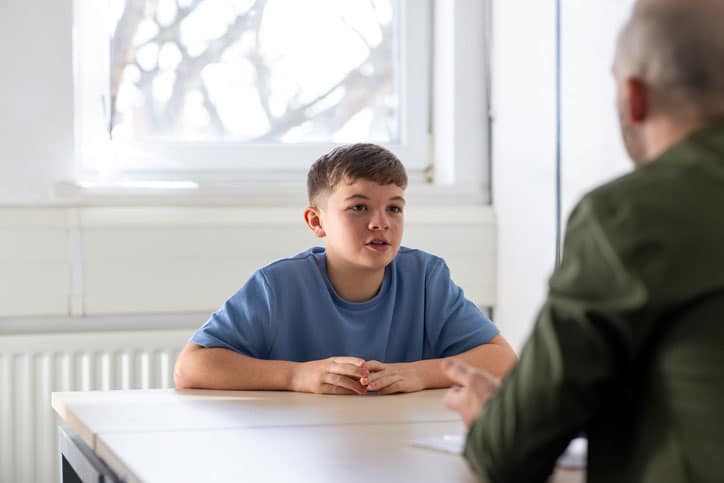Child Counseling in Troy, MI

In Troy, MI, child counseling offers a supportive space where our children can process anxiety, behavioral challenges, and emotional stress using proven techniques like play therapy. Early intervention helps kids build resilience, confidence, and healthy coping skills that set them up for lifelong well-being.
As parents, we play an essential role by partnering with experienced counselors to support our child’s growth both in therapy and at home. If you’re curious about finding the right counselor, we’ll walk you through what to expect next.
Understanding the Importance of Child Counseling in Troy, MI
Why does child counseling matter so much in today’s world? As we steer through an increasingly complex environment, we see the pressures children face—academically, socially, and emotionally—have intensified.
Child counseling offers a safe, supportive space for young people to process their feelings and experiences. With evidence-based approaches like play therapy, we help children communicate in ways that feel natural and non-threatening.
Through play, children can express emotions and work through challenges they may not yet have words for.
We recognize that strong social skills are foundational for lifelong well-being. In counseling, we guide children as they learn how to build friendships, resolve conflicts, and maneuver peer relationships.
This early support can set the stage for healthier interactions throughout their lives. By prioritizing child counseling, we invest in the resilience and growth of the next generation, equipping them to thrive despite the challenges they encounter.
Common Issues Addressed by Child Counselors
As we support children in guiding through life’s challenges, it’s crucial to recognize the specific concerns that often arise in counseling sessions. Many children in Troy, MI, seek help for issues like anxiety, depression, grief, family changes, and academic stress.
Child counselors frequently address behavioral difficulties, emotional regulation, and struggles with self-esteem. We also see children who are maneuvering social skills deficits, which can affect their ability to form and maintain healthy peer relationships.
Play therapy is a central tool in our work, providing a safe and age-appropriate way for children to express thoughts and feelings that may be difficult to articulate verbally. Through play, children can process complex emotions and experiences.
We help them develop coping strategies, emotional awareness, and resilience. By addressing these common issues, we empower children to thrive and equip families with practical guidance and support tailored to each child’s unique needs.
Signs Your Child May Need Counseling in Troy
As parents and caregivers, we may notice sudden behavioral changes at home or an increase in emotional outbursts from our children. These patterns can be early indicators that our child is struggling with something significant.
Recognizing these signs early allows us to seek the support they may need through counseling.
Schedule Your Free 20-minute Consultation Today with Open Door Counseling Center
Contact us today for your appointment request.
Clinton Twp (586) 203-2715 • Troy (248) 509-2308 • Text (586) 330-9415
Email Us HereBehavioral Changes at Home
Even subtle shifts in a child’s behavior at home can signal deeper emotional struggles that warrant our attention. When we notice changes such as withdrawal from family activities, loss of interest in favorite games, or new challenges with playground safety—like being unusually fearful or aggressive—we should pause and reflect.
Increased sibling rivalry, especially if it escalates beyond typical disagreements, can also indicate underlying distress. As caregivers, our role is to observe these patterns with compassion and discernment.
Research suggests early intervention is vital; the sooner we recognize and address behavioral changes, the more effectively we can support a child’s well-being. By fostering open communication and seeking professional guidance, we demonstrate our commitment to creating a safe, nurturing environment where children can thrive.
Emotional Outbursts Increase
Why do some children suddenly react with intense anger or tears over situations that once seemed minor? When we notice frequent emotional outbursts, it’s often a sign our children are struggling to manage overwhelming feelings.
These reactions may point to underlying issues with anger management or emotional resilience. As caregivers and advocates for children, we need to recognize when this pattern signals a deeper need for support.
Consider these indicators:
- Emotional reactions seem disproportionate to the situation and occur regularly.
- Attempts to calm or redirect the child have little effect, suggesting difficulty self-soothing.
- Outbursts are impacting relationships at home or school, creating distress for the child and others.
Professional counseling in Troy, MI can help children develop stronger coping skills and emotional understanding.
How Troy, MI Child Counseling Works

When we begin child counseling, we start with a thorough assessment and collaborate on clear goals tailored to your child’s needs. We use evidence-based therapeutic techniques, such as play therapy or cognitive-behavioral strategies, to support progress.
Throughout the process, we closely observe your child’s development and adapt our approach to guarantee the best possible outcomes.
Assessment and Goal Setting
Before effective child counseling can begin, we prioritize a thorough assessment to understand each child’s unique strengths, challenges, and needs. This initial step allows us to connect with families and gather insights through interviews, observations, and standardized tools.
By doing so, we tailor our approach, whether focusing on play therapy to foster expression or building social skills for positive peer relationships. Our goal-setting process is collaborative, ensuring that children’s voices and family perspectives guide our next steps.
- We identify areas where children excel and where they struggle, using evidence-based methods.
- We set clear, measurable goals in partnership with families, always considering the child’s developmental stage.
- We develop an individualized plan that supports growth, resilience, and healthy social interactions.
Therapeutic Techniques Used
With a clear understanding of each child’s needs and collaboratively set goals in place, we apply a range of therapeutic techniques tailored to support growth and emotional well-being. In our work, we often utilize play therapy, which allows children to express themselves naturally and process experiences in a safe, supportive environment.
Play therapy helps us build trust, model healthy coping skills, and address emotional or behavioral challenges through age-appropriate activities.
We also incorporate art therapy for children who may find it difficult to communicate verbally. Through drawing, painting, or other creative outlets, children can externalize their feelings and gain insight into their internal world.
Both art therapy and play therapy are evidence-based approaches that foster self-awareness, resilience, and positive change, aligning with our commitment to compassionate, effective care.
Progress Monitoring Methods
Because every child’s journey is unique, we closely track progress using structured assessments and regular check-ins with both the child and their caregivers. Effective progress tracking allows us to adapt our approach, ensuring that counseling remains responsive to each child’s evolving needs.
We rely on evidence-based outcome measurement tools to gauge meaningful change, always seeking honest feedback from families. This collaborative process helps us celebrate milestones and address challenges proactively. Our goal is to empower both children and their support networks through clear, measurable outcomes.
- Structured Assessments: We administer standardized tools to objectively evaluate emotional and behavioral growth.
- Regular Feedback: We gather insights from both the child and caregivers during sessions, fostering open communication.
- Goal Review: We consistently revisit therapeutic goals, adjusting strategies as progress unfolds.
Benefits of Early Intervention with Child Counseling in Troy
Although it can feel overwhelming when a child faces emotional or behavioral challenges, early intervention makes a profound difference in their overall well-being. By addressing concerns promptly, we can help children develop healthier coping strategies and prevent issues from escalating.
Research consistently shows that early support—such as play therapy—enables children to express emotions, process experiences, and build resilience in a safe environment.
When we intervene early, children have a greater opportunity to develop vital social skills, which are foundational for positive peer relationships and academic success. Early intervention also empowers families, offering guidance and tools so we can better support our children’s unique needs.
As professionals dedicated to serving others, we recognize that timely support fosters confidence, emotional regulation, and long-term mental health.
Ultimately, prioritizing early intervention sets children on a path toward a brighter, more balanced future, benefiting both the child and our entire community.
Choosing the Right Child Counselor in Troy, MI
When seeking the right child counselor in Troy, MI, we want to make certain our children receive compassionate, effective care tailored to their unique needs. It’s vital to find a professional who not only understands childhood development but also values evidence-based approaches like play therapy and art therapy.
By considering a counselor’s experience and areas of specialization, we can better guarantee our children feel safe and understood throughout their healing journey.
Here are three essential factors to guide us:
- Credentials and Experience: Verify the counselor’s licensure, clinical background, and proficiency in child-focused interventions, such as play therapy or art therapy.
- Therapeutic Approach: We should look for someone who integrates creative, age-appropriate modalities, supporting children’s natural ways of expressing emotions.
- Family Involvement: Choose a counselor who values our input and actively collaborates with us, reinforcing a team approach to our child’s well-being.
What to Expect During Counseling Sessions
During our child’s initial counseling sessions, we’ll notice a welcoming, supportive environment designed to help them feel safe and comfortable. The counselor will likely begin by building rapport, often using play therapy techniques. Play therapy allows our child to express emotions and thoughts in a natural, age-appropriate way.
As we observe, we’ll see that the counselor’s approach is grounded in evidence-based practices, aiming to foster trust and open communication.
Throughout sessions, the counselor may introduce activities focused on developing social skills, such as role-playing or interactive games. These tools help our child practice positive interactions and problem-solving strategies within a safe setting. We’ll be encouraged to share relevant background information so the counselor can tailor interventions.
Over time, we’ll notice our child becoming more confident in expressing themselves, and developing healthier ways to relate to peers and adults, all within a compassionate, professional framework.
Supporting Your Child Through the Counseling Process
As we observe our child engaging in counseling sessions, our involvement at home remains a pivotal factor in their progress. Research shows that positive reinforcement and strong family involvement can markedly enhance the benefits of therapy.
By fostering open communication, we can create a supportive environment where our child feels safe and understood. It’s vital to work collaboratively with counselors, reinforcing new skills and coping strategies learned in sessions.
Family involvement and open communication at home can greatly strengthen the positive impact of a child’s counseling experience.
Let’s consider three evidence-based ways to support your child:
- Model emotional openness: We can demonstrate healthy ways to express feelings, encouraging our child to share their own.
- Use positive reinforcement: Consistently acknowledge and celebrate small steps forward, boosting our child’s confidence and motivation.
- Stay engaged: Regularly check in with both our child and their counselor, ensuring we’re aligned in our support strategies.
With compassion and commitment, we can help our child thrive throughout their counseling journey.
Resources for Parents in Troy, MI
A variety of local resources in Troy, MI can empower us as parents to better support our child’s mental health journey. We can access counseling centers focusing on play therapy, which is proven to help children express emotions, build resilience, and develop coping skills in a safe environment. Local therapists often offer parent education sessions, equipping us with effective strategies to reinforce progress at home.
Community organizations in Troy also provide workshops and support groups centered on enhancing children’s social skills. These programs use evidence-based methods to help kids steer through friendships, resolve conflicts, and increase self-confidence—essential components for lifelong well-being.
Libraries and schools frequently host informational events, connecting us with professionals who understand our unique challenges.
As parents and caregivers, we all want the best for our children’s well-being. Recognizing when to seek child counseling is a courageous, proactive step. Evidence shows that early intervention can foster resilience and healthier coping skills.
By choosing the right counselor in Troy, MI, and staying engaged in the process, we empower our children to thrive. Let’s work collaboratively to support their emotional growth and make sure they have the resources they need to succeed.
Schedule Your Free 20-minute Consultation Today with Open Door Counseling Center
Contact us today for your appointment request.
Clinton Twp (586) 203-2715 • Troy (248) 509-2308 • Text (586) 330-9415
Email Us HereContact Us:
Open Door Counseling Center – Troy MI
(248) 509-2308
89 W South Blvd #200, Troy, MI 48085
Related Searches:

